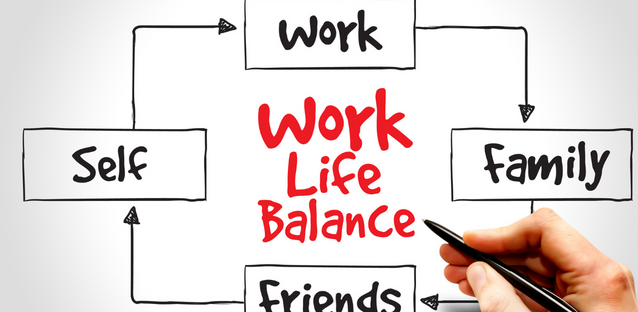If you commute, work from home, or work part-time, you must know how to maintain a work-life balance. This is important not only for your health and wellbeing but also for your overall productivity. Layboard.in presents a few tips for you.
What are life and work balances?
Working from 9 to 5 p.m. is slowly becoming irrelevant. Past generations may have considered work the most crucial thing in life, but today we have become more aware of the relationship between work and health. In addition, there is a growing awareness of the importance of personal fulfillment in one’s life. The concept of “work/life balance” (sometimes also abbreviated WLB) speaks for itself: it is a feeling of harmony between career and family life, the absence of conflict between the two. For example, if you work overtime, you may have a conflict between work and family, in which you cannot perform your duties equally well at work and family. This means that there is no balance between your work and personal life.
Typically, when people talk about achieving work-life balance, they are talking about a work schedule that does not require them to sacrifice their time for longer work hours. Yet, creating this balance is often critical to employee wellbeing and superior organizational culture.
Why is life and work balance so important?
Everyone wants more time to do what they love, so isn’t pursuing an optimal work-life balance simply self-defeating? Unfortunately, it’s not that simple. Achieving work-life balance has proven extremely important to office workers’ and freelancers’ mental and even physical health. Lack of such a balance can lead to what is known as “emotional burnout,” which the World Health Organization defines as follows
“…A syndrome recognized as the result of chronic workplace stress that has not been successfully managed…feelings of mental or physical exhaustion; increased mental detachment from work or feelings of negativism or cynicism associated with work; decreased professional effectiveness.
Emotional burnout is becoming increasingly common, causing employees to lose motivation and effectiveness. Unfortunately, it also leads to heart disease, high blood pressure, and various types of diabetes. So put, being under constant stress is wrong for both employees and businesses.
Employees who have an excellent work-life balance increase company productivity and reduce conflict between colleagues and management through increased motivation and lower stress levels.
Tips for work balance
Achieving a healthy work-life balance depends on taking a personal stance on the issue and acting in the right direction. Below are some tips to help you make sure that you and your work team are on the path to harmonizing your life:
Be aware of the importance of balance
You’d be surprised to learn that quality work-life balance is what people want most. A recent study found that employees are willing to be paid less in a company that treats them more humanly. Putting aside personal circumstances is a pretty big concession. Nevertheless, it is a clear indicator that people no longer view work as an essential thing in their lives just as a means to secure a certain standard of living. What does this mean for you and your team? Your colleagues need to know that you are looking after their interests and wellbeing in the office and at home.
Stop calling it balance
When it comes to work-life conflict, the idea of viewing balance not as a delicate balance but in terms of life as a whole is gaining popularity. So, for example, don’t assume that sending a few work emails over the weekend automatically deprives your weekend of ‘free time. Similarly, don’t assume that taking a break during the workday implies that you’re not working.
Manage your time and energy
A working day isn’t just about the number of hours you spend at your desk. Try approaching your work in a new way, perhaps by creating a task list or using a time management technique like Pomodoro. If you are a manager or supervisor, give your team the freedom to try different ways of working. Our performance naturally peaks and drops throughout the day – don’t expect your colleagues to demonstrate high levels of productivity consistently. This will make you feel less stressed and energetic and make the most of your non-work time.
Plan and manage expectations
Planning your work week will help you determine the amount of time you can devote to your personal life. For example, if you plan to binge every week, you may be susceptible to setbacks, frustrations, and burnout. Set more realistic expectations for yourself to evenly divide your energy between work and your personal life.
If you manage a work group, don’t expect the impossible from its members. Instead, try to approach a project knowing that things can go wrong and make allowances for this. Even the Navy’s PERT planning methodology considers that things don’t always go smoothly.
Think about your surroundings
You need to understand your surroundings whether you work from home or in an office. You’re unlikely to have much influence over the design of your office, but do your best to keep your work area clean and tidy. The adage ‘a clean desk – a spotless mind’ makes sense. Similarly, when you get home, ensure you’re in a place that allows you to relax and reduce your stress levels. Don’t think about work papers, and don’t open work emails on your phone. If you work from home as a freelancer, try to limit your office space to a room or desk you can step away from at the end of the day.
Don’t underestimate mental health
This applies to your work team as well as to you. More and more companies realize the importance of mental health days, meaning that employees have the discretion to take time off to recharge. Physical illness doesn’t have to be the only reason to take time off. Be frank with your team when discussing the importance of mental wellbeing, don’t be embarrassed or uncomfortable about not feeling your best all the time – no one feels that way. While this attitude doesn’t solve the problem, it can help psychologically de-stress. Unfortunately, 55% of employees worry about asking for time off to deal with mental health issues. By discussing mental health issues openly and honestly and not hiding your real feelings, you can help your workgroup reduce their stress levels and, quite possibly, the impact of these issues on employees’ lives.
Don’t act alone
Many modern companies see their teams as more than just names or numbers – they are becoming one big family. As a result, colleagues are invited to spend time together at social events and after work, and team chats in Slack or Zoom are usually the norm. Essentially, colleagues are encouraged to view each other as friends, people they can relate to and rely on. Such camaraderie can go a long way towards maintaining a work-life balance, as isolation has been found to negatively impact the motivation of those who start working from home without the support of other remote workers.
Nevertheless, distance cannot prevent your work team from staying in touch, especially today with many practical remote working tools at your disposal. Therefore, ensure everyone knows and has access to all the collaboration tools needed to create an easy-to-use single workspace.
At the heart of a good work-life balance is being able to deal with your personal and family life. That’s not to say that you shouldn’t give your professional life due importance, but you should remember that work and life outside work are equally important. Your colleagues are not just people you see with their laptops for eight hours a day. They are people who have hundreds of essential commitments outside of work. When you internalize this way of thinking, you will find that you can achieve a quality work-life balance.

